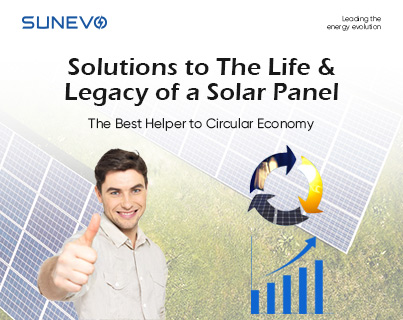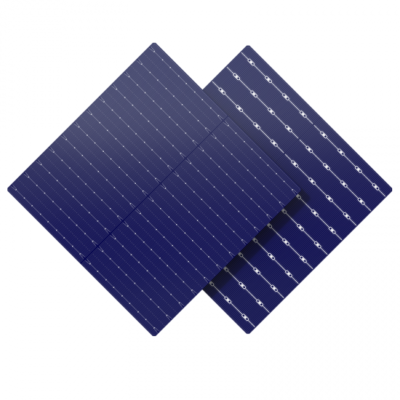
In an era marked by increasing environmental concerns and the urgent need to transition to more sustainable practices, renewable energy technologies have emerged as a beacon of hope. Among these, solar power has become a global favorite, with solar panels being heralded for their efficiency, affordability, and eco-friendliness. The wholesale solar panels market has seen exponential growth, and this trend appears to be on a steady upward trajectory.
However, this widespread adoption of solar panels has also led to the emergence of a new challenge – solar panel e-waste. As the lifespan of these panels come to an end, they turn into potential sources of waste, which, if not handled responsibly, can negate some of the environmental benefits they offer. This is where the concept of a circular economy comes into play. A circular economy is an economic model that focuses on eliminating waste and the continual use of resources, offering a practical solution to the e-waste challenge.
Understanding Circular Economy
At its core, a circular economy is a regenerative system designed to minimize waste and maximize resource efficiency. It encourages the reuse, sharing, repairing, refurbishing, and recycling of existing materials and products as much as possible. By doing so, it promotes a shift towards renewable energy sources and aims to design waste out of the system.
This approach can be applied across various industries, including the manufacturing sector. By adopting circular economy principles, the manufacturing industry can reduce environmental degradation, promote sustainability, and contribute to a healthier planet. When applied to the solar panel industry, a circular economy can help tackle the escalating issue of solar panel waste, making the industry more sustainable in the long run.
Solar Panels in the Circular Economy
Solar panels have a significant role to play in the circular economy. They can contribute to resource conservation and waste reduction, especially when designed with their end-of-life stage in mind. This involves designing solar panels for easy disassembly, using materials that can be effectively recycled, and implementing take-back schemes.
In the booming wholesale solar panels market, incorporating such features into solar products can significantly reduce the environmental impact. It can lead to a decrease in the amount of waste generated and an increase in the number of resources that can be recovered and reused. This, in turn, can contribute to a more sustainable and eco-friendly solar panel industry.
End-of-life Recycling of Solar Panels
As solar panels reach the end of their lifespan, they become potential sources of waste, also known as PV module e-waste. This is a complex issue given the variety of materials solar panels contain, which makes their recycling a challenging process.
Despite these challenges, innovative recycling technologies and processes are emerging. These technologies offer ways to recover valuable materials from old panels, thereby reducing waste and conserving resources. Such advances are instrumental in transforming the solar panel industry into a circular economy, making it more sustainable and responsible.
Environmental Benefits of Circular Economy Solutions
The adoption of circular economy principles in the solar panel industry comes with an array of environmental benefits. For starters, it leads to reduced carbon emissions, as the recycling and reuse of materials significantly cuts down the emissions associated with producing new materials.
Moreover, it leads to minimized resource depletion. As more materials are recycled and reused, the need to extract new resources is reduced. This can help conserve valuable natural resources and protect biodiversity.
Lastly, it leads to decreased energy consumption. Recycling processes generally consume less energy than the processes involved in extracting and manufacturing new materials. Therefore, by promoting recycling, we can significantly cut down on energy usage.
Economic Opportunities in the Circular Economy
Circular economy solutions offer significant economic opportunities as well. They have the potential to create new jobs in areas such as e-waste management, recycling, and the refurbishment of solar panels. They also stimulate innovation, as businesses and individuals look for new ways to maximize resource efficiency and minimize waste.
For instance, the recycling of solar panels can create new industries centered around e-waste management and recycling. Furthermore, as the demand for wholesale solar panels increases, businesses that incorporate circular economy principles into their operations can gain a competitive edge, driving economic growth.
Policy and Regulatory Frameworks
Promoting a circular economy in the solar panel industry requires supportive policies and regulations. These can encourage manufacturers to design more recyclable products and stimulate the development of effective recycling technologies.
There are already successful examples of countries and regions implementing robust regulatory frameworks that support the circular economy. These examples serve as valuable models for other regions looking to promote circular economy solutions in the solar panel industry.
Case Studies and Success Stories
Several companies and projects have successfully implemented circular economy practices in the solar panel industry. These success stories serve to inspire and guide others in the industry towards more sustainable practices. They show that it is possible to balance economic growth with environmental responsibility.
Challenges and Future Outlook
While the circular economy offers a promising solution to the environmental challenges posed by solar panel waste, it is not without its hurdles. Challenges include technical difficulties in recycling, lack of awareness, and need for supportive policies.
However, with ongoing research and development, the future looks promising for circular economy solutions in the solar panel industry. As more businesses and individuals become aware of the benefits of these solutions, and as technology continues to advance, we can expect to see more and more circular economy principles being integrated into the solar panel industry.
Conclusion
In conclusion, integrating circular economy principles into the life and legacy of solar panels has significant environmental, economic, and social benefits. It presents a viable solution to the growing issue of solar panel e-waste, reduces environmental harm, and creates economic opportunities. Therefore, it is crucial for all stakeholders in the renewable energy sector to explore and support circular economy initiatives.






Leave A Message
If you are interested in our products and want to know more details,please leave a message here,we will reply you as soon as we can.
Subject: Life & Legacy of a Solar Panel: Circular Economy Solutions